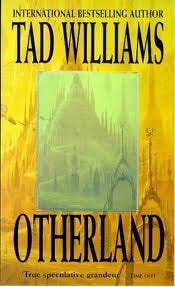If Ben Bova Was Almost Right, Was Tad Williams More Right?
Towards the end of last year, I wrote about the novel "Cyberbooks" by best selling science fiction author Ben Bova. The book was published in 1989 and foretold the creation of a tablet sized electronic reader and the havoc it would wreak on a hide bound and deeply myopic publishing business.
That book has experienced a little bit of a renaissance because of what is happening in the book and magazine publishing industry. Recently I've had fun reading or re-reading a slew of "futuristic" novels that describe in detail what our world may look like in the not too distant future. Not surprisingly, most of them are dystopian in their outlook.
One book that is frequently on my mind during the work week is the over the top, incredibly interesting, fun and scarily "Yeah, I could see that happening!" novel "Jennifer Government" by Australian writer Max Barry. If you're in the book business, you'll surely prick your ears up every time "Barnes & Noble" and "mall" gets mentioned.

But the purpose of this post is to point you at another dystopian novel by fantasy writer, Tad Williams. Tad Williams is a not too recent rediscovery for me. His first novel, "Tailchaser's Song" traveled around in my briefcase shortly after it came out in paperback sometime in the late 1980's. I enjoyed the book immensely in part because there are so few novels that include cats and that aren't all cutesie pie. In fact "Tailchaser's Song" has more in common with "The Hobbit" than it does with anything by Lillian Jackson Braun.
I had forgotten about this novel and it's author until I stumbled across the first book of his recently completed "Shadowmarch" series. If you have any interest in fantasty novels and world creation, pick these books up. Williams has created an intriguing story line and brought to life unforgettable characters. I was genuinely sad to complete the series and say good-bye to them. Reading "Shadowmarch" and the three novels in the series that followed it lead me to his "Memory, Sorrow and Thorn" series which posts on a series of fan walls suggested was superior to "Shadowmarch." I'd respectfully disagree.
While on vacation last month I plugged my reading habits back in to more "contemporary" American literature and about halfway through a "highly recommended" work, I found myself completing fewer and fewer pages each night until I finally decided I needed to go somewhere else.
In the late 1990's, Williams took a break from fantasy and plunged into science fiction and wrote the series, "Otherland".
I haven't finished the series. In fact, I am only less than halfway through the second book and I have to say that maybe it's the cold this winter, or maybe a little "Seasonal Affected Disorder", or the early morning dog walks in the near dark. But something is seriously slowing down the pace of my reading. Perhaps it's the plausibly gloomy take that Williams has on the near future's society although I am still really enjoying the book. It's certainly not as funny as Barry's vision. But it does have more bite.
What got my attention in the first Otherland novel, "City of Golden Shadow", was the use of personal computers, and in particular, tablet computers, by the characters in the story. Virtual reality plays a huge role in this series and it's all important in the second novel, "River of Blue Fire." But it was how the people Williams created and how they interacted their daily lives that grabbed me.

Tablets aren't a new thing to science fiction and fantasy writing. After all, Bova wrote about tablet readers seven years earlier. Around the time this first book was written, Captain Picard of the Enterprise was reading one in his Ready Room. Two years after the publication of "City of Golden Shadow", I attended an industry convention where the key note speaker roused the ire of an entire room by asking the question,
"Why are we still talking about smearing ink on dead trees?"
No, that didn't go over so well.
What I liked about the portrayal of the tablets in the first novel was their ubiquitousness and how natural they were to the characters who used them. It could be that had I read the book when it was first published in 1996 I would have said "Wow!" instead of "Hmmm, this guy had some good foresight!" The short "blurbs" that open each chapter, small news and entertainment clips from the net of the future are darkly humorous.
In today's reading marketplace, tablets are all the rage and the recent CES show in Las Vegas was all about the latest releases. What had originally started me on this post was a passage in "River of Blue Fire" where a small girl is reflecting on some "print on paper" books her mother had saved and what she was thinking while she was reading them. As I read through that passage, the thought crossed my mind, "This would be great for a post!" But it was a library book so I couldn't dog ear the page and the bit of Kleenex I used to mark the page fell out.
Of course, now I can't find it. And I wanted to get this post up. So I'm writing this instead of using that passage.
What I find most interesting about the series to date is how society in Williams futuristic world adapted to technology and not the other way around. The tablets that were wielded in the first novel certainly seemed helpful to day to day life. The rest of technology that the characters interacted with seemed to drive their actions and their lives.
Look around your home and your office. Think about what drives the publishing industry today. Sound familiar?
I'm just asking.


